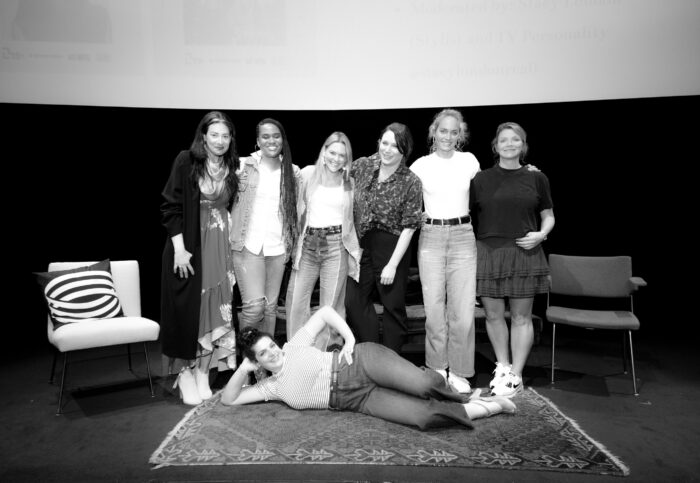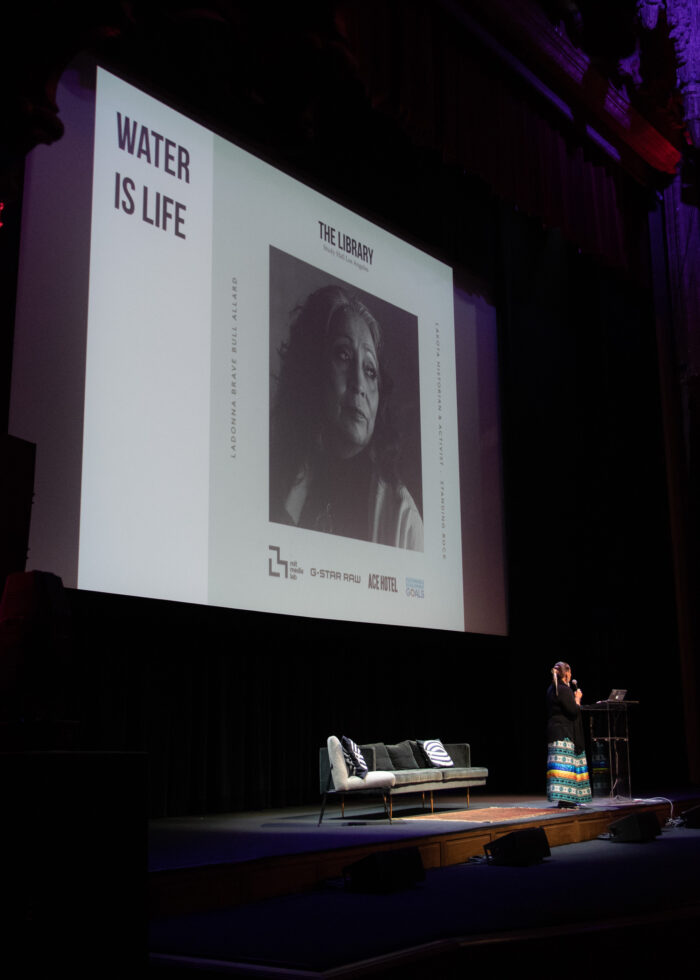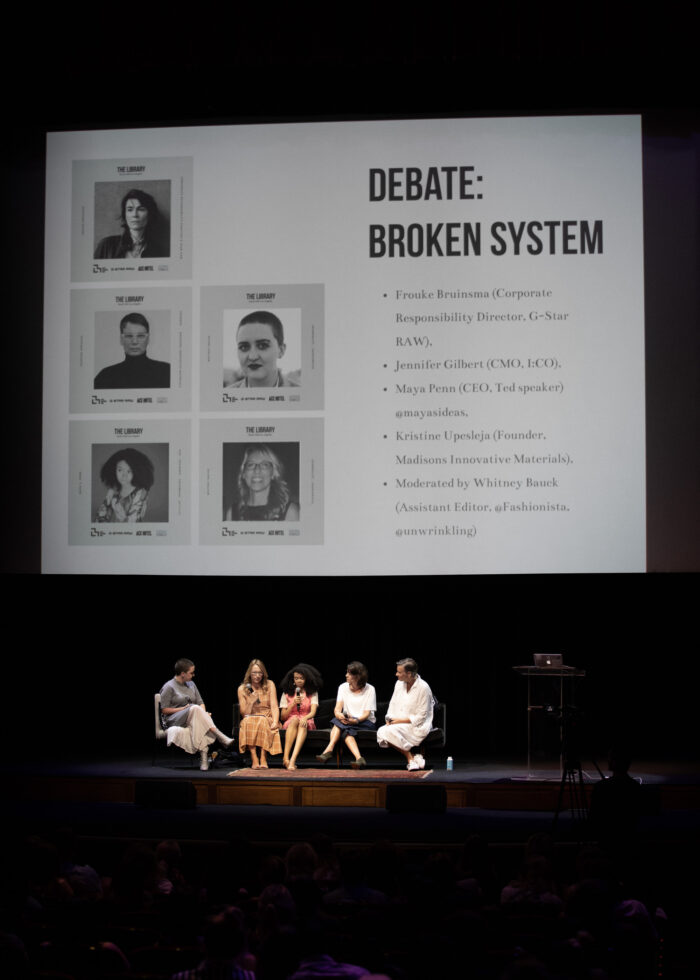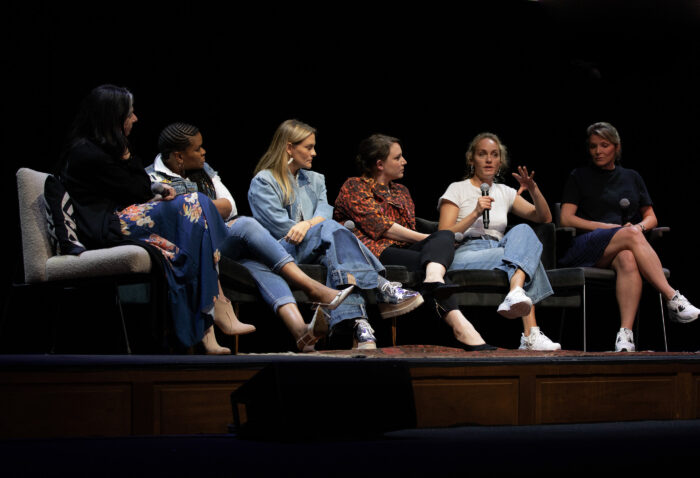Study Hall Los Angeles exposes the interconnectivity between fashion and our ecosystem
On August 26th, we were honored to contribute to Study Hall, a conference and educational initiative powered by The Library, MIT Media Lab and G Star Raw. This gathering of changemakers, industry leaders, scientists, researchers and activists, took place at the The Theater at Ace Hotel in Los Angeles.
This meeting of the minds, set amid an ornate 1920’s built Spanish Gothic-style backdrop, commenced with warm words by organizer Céline Semaan, founder of The Library and Slow Factory, a sustainable luxury fashion label that works at the intersection of consumers and industry to educate through immersive conferences. Semaan paid homage to her roots while sharing a glimpse into the truths behind the industry and her own personal hope for a sustainably inclusive future:
“I come from the necessity to embrace ancient wisdom related to sustainable living in order to survive a post colonial era.” She continued, “Our supply chains and each of the most used materials in fashion expose the obvious: Colonialism is a continuing economic reality. Exploitation of cheap labor, modern day slavery, and extreme poverty are the result of a colonial system that continues to benefit from its colonies.”

Fashion’s dependency on water, soil, and other valuable resources was echoed throughout the dynamic conversations. That ‘connectedness’ was ignited with an opening keynote by Standing Rock Founder, Ladonna Brave Bull Allard. Lakota historian and activist, Allard encouraged the audience to be of the water protectors and to take cue from the Lakota culture of which considers seven generations back and seven generations forward in everything they do.
“Water is life. Water is female. Through water we bring children into this world. To water we cloth our children, we raise them. We bring food through water,” said Allard. ”Through everything that lives is water. The trees that grow, the minerals the animals, everything relies on water. Without water we die.”
Although many problems regarding the current political climate and Western reign of the apparel industry were exposed, the purpose of the event was to share the wisdom of collective solutions. Main topics included circularity, denim, & human rights.

Our very own Lauren Fay, US Country Coordinator for Fashion Revolution USA, moderated, a panel discussion addressing colonialism and the social challenges facing the global supply chain that was entitled “Colonialism, Human Rights, & Supply Chain”. Panelists included Benjamin Skinner (Founder, Transparentem); Sam Raddochia (Co-Founder, Chronicled & Better Kinds), Anna Banks (Fair Trade USA), and Sissi Johnson (Brand Strategist – MBA Professor in Fashion Innovation, Culture & Identity).
“It was a privilege for Fashion Revolution USA to be a part of StudyHallwith the Library Eco. The work that this conference is doing to reframe the discourse of sustainable and ethical fashion is hugely important. We should be talking about politics, history, and accountability all the time. So that as we change things in fashion, we take the opportunity to fix multiple issues. That is the potential of this movement.”- Lauren Fay

“Africa is the next frontier, every has the eyes on Africa right now and address it as a country. It really isn’t a country. Companies tend to have this approach of ‘we are going to tap into the African market’. There is no such thing as an African market. Everything from the people to the languages is multiple. There are nuances on the continent, nuances inside each country. It’s important for companies, especially from the West, to invest in cultural awareness.” -Sissi Johnson
“We understand that for millions of people the apparel industry is the first step off the ladder of absolute poverty. What we are trying to do is making sure that is a safe step– to ensure adequate human rights.” -Benjamin Skinner
Next, a debate was led by Whitney Bauck, the Assistant Editor at Fashionista, about the apparel industry’s “Broken System” examining the environmental weight we carry on our shoulders as consumers, as governments and as companies. Frouke Bruinsma (Corporate Responsibility Director, G-Star RAW), Jennifer Gilbert (CMO, I:CO), Maya Penn (CEO, Ted speaker) and Kristine Upesleja (Founder, Madisons Innovative Materials) voiced their concerns and opinions.

“Right now we are in a linear economy. We take resources off the planet, we make things, use them, toss them and then buy more. Not until recently has the industry really taken that on to make products that are reusable and recyclable and really think about design from the beginning. And on the consumer side, not a lot of thought has gone into what do we do with the clothes when we don’t want them any longer. It’s time for a circular economy and what that means is that nothing ever goes to waste and it’s kept in a closed loop production cycle.” -Jennifer Gilbert
“A lot of people have their heart in the right place, but for some reason thinking about how your wardrobe contributed to the environment doesn’t exists. That luck of education and public knowledge makes that big disconnect. There needs to be a honesty and genuine care in the industry. Caring doesn’t have to negatively impact our economy.” -Maya Penn
Presentations focused on circularity, bringing a sense of hope and optimism, included talks by G-Star RAW (Adriana Galijasevic) Eileen Fisher (Shona Quinn, Sustainability Director), The New Denim Project (Joanna Engelberg), Soorty (Ebru Debbag), Everybody World (Iris Alonzo), and The Library: Sustainable Standard (Céline Semaan).

The final presentation of this enlightening day only reiterated that a circular future is not possible without inclusion and diversity as Semaan shone light on that fact that the world’s richest account for 10% of global emissions, while the poorest 3.5 billion account for just 1/10. Moderated by Stacy London, panelists discussed best practices for a circular future. Speakers included Amber Valletta (Supermodel and Sustainability Advocate), Pashon Murray (Founder, Detroit Dirt), Patricia Ermecheo (Founder, Osomtex), Claire Bergkamp (Head of Sustainability at Stella McCartney) and Kristy Caylor (Founder, For Days).
“Food waste is a 218 billion dollar issue annually in this country alone. According to the UN we have 60 years of harvest left in the world. The model of Detroit Dirt is to take that food waste and make byproducts with that food waste and distribute them into the communities to make biofuels, compost, nutrients, and so forth. You have a market and an industry within this system. This is a reflection of what I see a closed loop model is.” -Pashon Murray
“It’s not that it’s fast, it is that it’s disposable. If you’re not spending a lot of money on something inherently that is not a problem if you’re treating it well and it lasts a long time.” -Claire Bergkamp
“When you have a lot of people’s attention your responsibility is to help educate and to help build awareness. And I think more of us need to come out of the fear based ‘I’m going to blamed for problems’ and be a little vulnerable and show what you are doing right and what you are going to continue to do right. Be accountable.” -Amber Valletta





